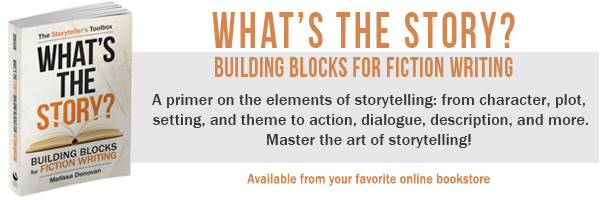It happens to all writers. You’re cruising through a story, and all of a sudden you hit a wall. Your characters freeze up, your plot stops cold, and you’re stuck with nowhere to go.
You’ve hit a fiction writing roadblock.
All of your ideas have evaporated and you sit there staring at your screen with a blank look on your face. Where were you going? How did you write yourself into a corner? More importantly, how do you write yourself out?
Fortunately, there are techniques you can use to break through the creative blocks that arise in the middle of a storytelling project. Some of these techniques also come in handy when developing ideas for new fiction projects.
The main thing you need to remember is that hitting a roadblock does not have to mean the end of your story, your fiction writing, or your creativity. You just need to reboot and see your project from a fresh angle.
Breakthrough Techniques
The techniques explained here are sledgehammers. They’ll blast through walls, blow away obstacles, and create doorways that you can step through to reconnect with your story.
Pull Your Characters Out of the Story
Is your character stuck in a situation with no way out? Has your character gone on strike, refusing to take further action? Are secondary characters loitering around with nothing to do? Try removing the troubled character from the story you’re writing and placing them in a completely different situation. You don’t have to write a novel, but sketch some ideas about how your character would behave in various scenarios. Then bring them back to the story you were working on and see if your creative wall hasn’t cracked.
Try Fiction Writing Exercises
Fiction writing exercises provide a constant stream of ideas. You can find websites, magazines, and books that provide activities to kick your writing and your imagination into high gear. Look for exercises that are specific to the problems you’re having. If your plot isn’t going anywhere, find plot exercises. If you are having trouble with dialogue, look for dialogue exercises. I wrote Story Drills: Fiction Writing Exercises for storytellers who need guidance and inspiration — it has a little of everything and can knock down all kinds of creative walls.
Break it Down
Sometimes we get stuck because something’s wrong with the plot or structure. If you’re writing a manuscript, it will be difficult to see the bones of your story. Convert your manuscript into an outline that lists all major plot points. Then you can more easily see where the story took a wrong turn. If you’re having character problems, create outlines that isolate character arcs. Keep using these outlines to find and resolve problems in your plot and structure.
Go Deep
Sometimes the biggest problem with a story is that it’s flat. The characters are lackluster; the plot is boring. This is likely because these story elements are underdeveloped — there’s not enough detail or depth. Pause work on your manuscript to work on developmental projects like character sketches, plot outlines, world-building, and research that will add layers of detail to your creative vision, which will then get fleshed out in your writing when you resume work on the project.
Expand Your Vision
Sometimes what’s missing isn’t detail but entire chunks of a story; if your story feels thin, then you can add characters and subplots to plump it up. I had written multiple drafts of a novel when I was struck with a new character. I didn’t think much about it — I just started writing a chapter about her. It became the first chapter of the novel and she became the thread that tied the entire series together. Similarly, you might find that your plot lacks dimension; introducing new story threads and subplots can make your tale more dynamic.
Get a Second Opinion
We all grow blind to our own strengths and weaknesses. Maybe you’ve started to think your story isn’t as great as you originally envisioned. Maybe you have a nagging feeling that something is wrong with it, but you’re not sure what. This is often a good time to get a second opinion. A writer friend is ideal for this, but you can also work with a developmental editor or a writing coach. Find someone you can trust, who is knowledgeable about writing (and your genre), someone who will give you honest feedback and help you get back on track. Sometimes the mere act of discussing the project with another person will illuminate the problem and reveal a solution.
Don’t Give Up on Your Story
Storytelling is not an easy endeavor, and the best traits for writers to cultivate are patience and determination. Sure, some stories are destined for the recycling bin. Successful writers produce a lot of garbage before they eke out a gem. But don’t give up on a project when you hit your first roadblock. If you do that, you’ll never get anywhere.
Whether you write yourself into a corner, lose interest in your plot or characters, or get tempted by a newer, shinier idea, stick with your project and see it through to completion. Pay attention to what’s going on when you’re at your most creative and learn how to get into that state on command. Writers need to get to know how their minds work and what brings out the best ideas. This is how each writer develops a reliable set of techniques or a routine that produces good results.
Also, stock up on creativity resources. Look for books on creativity and expose yourself to plenty of art and entertainment. Also, try other creative outlets, such as painting, dancing, photography, or music. Remember that like attracts like, so the more creative you are, the more creative you’ll be.
How do you break through fiction writing blocks? Share your thoughts and ideas by leaving a comment.






Melissa, this is where I am. I wrote 37,000 words of my novel, and everything froze. I’ve since changed the plot and some of the characters. Now, I’m rewriting and struggling with dialogue. I like your suggestions and will give them a try. I have Story Drills: Fiction Writing Exercises; I’ll consult it for more options. Thank you for a timely post.
Hi Billie. This is not unusual. Writers often run into road blocks. There are a few tools you can use to avoid or get around them. I usually recommend doing some developmental work before drafting. This often starts with a story summary (one paragraph to one page) followed by working out a story’s three-act structure. Around this time, character sketches can be immensely helpful. Once all that material is nailed down, outlining begins.
The reason these exercises are so useful is because we can work out the plot, characterization, and story structure before writing a full draft. It’s much faster and easier to fix problems in a one-page summary or a thirty-page outline than to try to work through hundreds of pages or tens of thousands of words. Writers can also use these tools and exercises at any point during the writing process.
Often, when working with drafts, writers will make major changes to plot and characters–but these changes don’t necessarily fix problems. In fact, sometimes they create a bunch of new ones, especially when the story deviates from the author’s original artistic vision. Some other options for working through these kinds of issues would be working with alpha readers, a writing coach, or a developmental editor.
I wish you the best of luck with your project, and I hope you’ll stick with it.
I have mentioned this on my blog, several times. There is no “writer’s block”. The Muse is on, 24/7. A “block” is simply trying to control a story and unless you’re writing pure formula (there’s no way to stuck there) then the simple truth is get out of your own way. No on is cooperating because the author stopped listening and decided to insert his/her self into the middle of everything. Get out of the way. If you’ve written yourself into a corner, go back to where you took the wrong turn by force of will, throw it away and let the story tell itself. there is no writer’s block, there are only writers in their own way.
Hi Phil. Writer’s block is just another way of saying that something is getting in the way of one’s work. I appreciate that you’ve shared your experience with writer’s block, but it is actually very real for many writers, and there are a variety causes. You have certainly identified one (get out of your own way). But other issues can inhibit people from writing, and that includes anything from stress to health problems to being overwhelmed, hungry, fatigued, out of shape, and a litany of other root causes. And some people feel like they’re experiencing writer’s block when they simply feel uninspired. If someone claims they have writer’s block, I’d try to help them find the cause and work through it.
Going back in and adding in a detail to an earlier part often helps me! Chap. 14 both of the pov’s friends well into the rapids as the rope bridge was set on fire. I hit a wall there for days. Like, how is he to help them with a cracked rib, his sword destroyed and he can’t swim in the water? so I went back to the start of the chapter added in a description of a decaying bridge and used the broken pieces of the bridge posts to help him get them out. (He still had to climb down to the canyon.) We are author gods can can add or delete hah-haha-!
Oh yes, sometimes we write our characters into corners, which is exciting, until it’s time to write them out! Thank goodness we can go back and make changes to ensure they can get out of those tight spots.
I got stuck on a long short story. I realised it was actually boring. So I struggled for a while, but now I’ve decided I’ve used the wrong POV character. I think I can now start again and finish it.
I also have a half-written novel. I’ll try some of your suggestions and maybe it’ll get finished. I think I need some subplots as well.
Good luck!